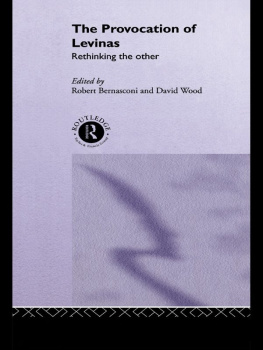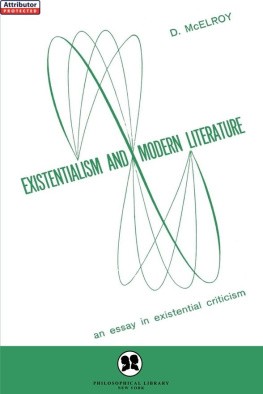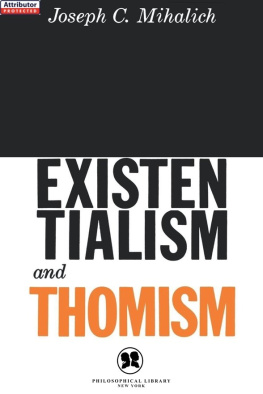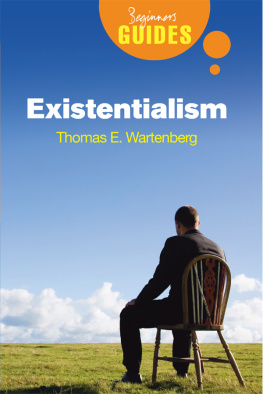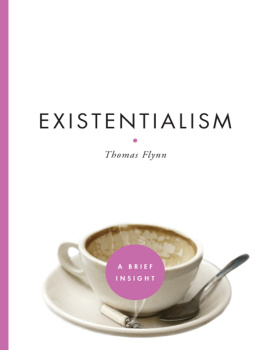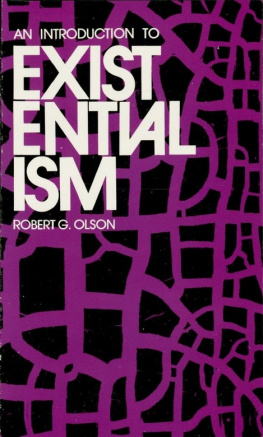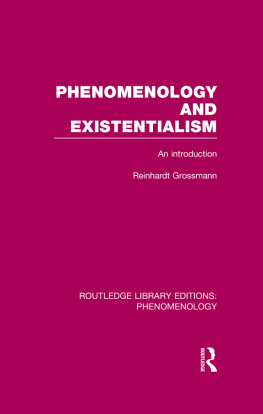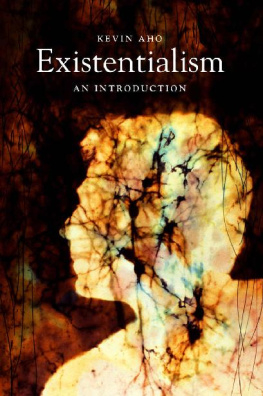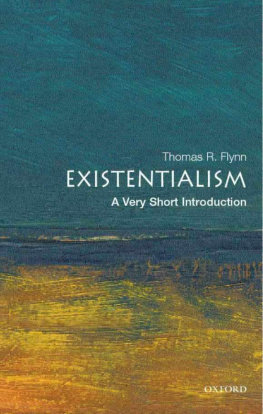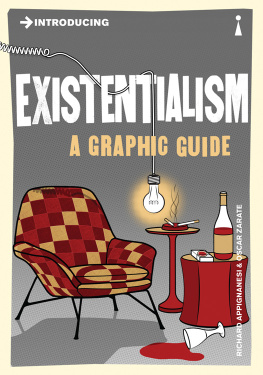S ITUATING EXISTENTIALISM
Situating Existentialism
KEY TEXTS IN CONTEXT
EDITED BY JONATHAN JUDAKEN AND ROBERT BERNASCONI
| COLUMBIA | UNIVERSITY PRESS | NEW YORK |

COLUMBIA UNIVERSITY PRESS
Publishers Since 1893
| NEW YORK | CHICHESTER, WEST SUSSEX |
cup.columbia.edu
Copyright 2012 Columbia University Press
All rights reserved
E-ISBN 978-0-231-51967-0
Library of Congress Cataloging-in-Publication Data
Situating existentialism : key texts in context / edited by Jonathan Judaken and Robert Bernasconi.
p. cm.
Includes bibliographical references and index.
ISBN 978-0-231-14774-3 (cloth : alk. paper) ISBN 978-0-231-14775-0 (pbk. : alk. paper) ISBN 978-0-231-51967-0 (e-book)
1. Existentialism. I. Judaken, Jonathan, 1968 II. Bernasconi, Robert.
B819.S546 2012
142.78dc23
2012001709
A Columbia University Press E-book.
CUP would be pleased to hear about your reading experience with this e-book at
References to Internet Web sites (URLs) were accurate at the time of writing. Neither the author nor Columbia University Press is responsible for URLs that may have expired or changed since the manuscript was prepared.
Contents
Jonathan Judaken
Val Vinokur
Peter E. Gordon
Jonathan Judaken
George Cotkin
Martin Woessner
Eduardo Mendieta
George Pattison
Paul Mendes-Flohr
Ronald Aronson
Samuel Moyn
Charles Bambach
Robert Bernasconi
Debra Bergoffen
Ethan Kleinberg
S ITUATING EXISTENTIALISM
Jonathan Judaken
A philosophizing that begins by casting light on the situation remains in flux because the situation is nothing but a ceaseless flow.... If I take the illumination of the situation for the starting point of philosophizing, I renounce objective explanations that would deduce existence from principles as one whole being. Instead each objective thought structure has its own function.
Awaking to myself, in my situation, I raised the question of being.
Karl Jaspers, Philosophizing Starts with Our Situation, in Philosophy, vol. 1
Existentialism Is an Anti-Ism
Situating Existentialism is a history of the process of systematizing and canonizing existentialism as a movement of thought. As such, it reconstructs a shared dialogue about the human condition in the form of a series of reception histories. But it does so in a somewhat disjointed set of frames, for the process of establishing existentialism as a distinctive brand of theorizing about the human predicament in modernity was welded together only in hindsight.
One might assume that an overview of the history of existentialism would offer a definition of its subject at the outset. But existentialism, in principle, rejects a neat dictionary definition or formulation. It is not a consistent or systematic philosophy or approach to thought.
Jean-Paul Sartre, existentialisms most famous exponent, rejected the invitation to define existentialism: It is in the nature of an intellectual quest to be undefined, he wrote. To name it and to define it is to wrap it up and tie the knot. What is left? A finished, already outdated mode of culture, something like a brand of soap, in other words an idea.Situating Existentialism seeks to reconstruct the history that has led to how existentialism has come to be defined, systematized, and canonized.
So rather than a definition, we offer a description of existentialism. This description is historically informed, porous, and sensitive to national variation. That is, to describe existentialism is to reconstruct an interchange among a group of thinkers from different regions who came to share a vocabulary for naming a set of problems in the shared setting of modernity.
Our approach is the only viable one given that the writers grouped together as existentialists offer no coherent creed or body of thought or doctrine. There is surely no clear party line. Neither is existentialism, as is so often claimed, reducible to an intellectual mood. In fact, among those thinkers generally lumped together and labeled existentialists there are profound differences on foundational issues: irreconcilable positions on God and religion; widely divergent views on politics; and oftentimes opposed outlooks regarding ethics.
Albert Camus, for example, believed that Gods existence had little bearing on the human condition. In his notebooks, Camus remarked that I often read that I am atheistic; I hear people speak of my atheism. Yet these words say nothing to me; for me they have no meaning. I do not believe in God and I am not an atheist. In fact, it would not be an exaggeration to say that much of modern theology in the Christian and Jewish traditions is a footnote to Kierkegaard, so influential was he on the thought of such Christian existentialists as Karl Barth, Rudolf Bultmann, Paul Tillich, and Dietrich Bonhoeffer and Jewish thinkers such as Martin Buber, Franz Rosenzweig, and Emmanuel Levinas.
Kierkegaard also was a thoroughgoing critic of all collective movements, insisting that where the crowd goes, untruth reigns. As such, Sartre was a fellow traveler of communism, Third World radicalism, and Maoismin short, the ambassador of theory to revolutionary politics throughout the postwar period. At the other extreme of the political spectrum, Heideggerwho profoundly influenced not only Sartres ideas but also much of existentialismwas a card-carrying member of the Nazi Party, which has posed a recurrent problem for those inspired by his thought.
If there is no coherence on matters of religion or politics, there is also no unity when it comes to questions of ethics. A distinguishing feature of the existentialists ontological and ethical projects is the importance they give to alterity: the being of the other. But there were extensive variations in how the relationship between the self and other (both individually and collectively) was understood. So for Marcel, Jaspers, and Buber, unlike for Sartre, all relationships can move beyond seeing others as objects.
When it comes to ethics per se, these differing notions of alterity entail differing stances on morality. In The Ethics of Ambiguity, Simone de Beauvoir rejected any form of absolutist ethics: there are no absolute values before they are embodied in action. The epigraph from Michel de Montaigne to de Beauvoirs Ethics sums up her view: Life in itself is neither good nor evil. It is the place of good and evil, according to what you make it. Rather than seeking absolutes (or absolution), de Beauvoir called for us to engage in a process of permanent liberation because we live in permanent tension, always caught in ambiguity. As such, morality resides in the painfulness of an indefinite questioning.
In Either/Or, Kierkegaard, like de Beauvoir and Sartre, emphasized the centrality of choice within the ethical sphere of life. In Fear and Trembling, however, he suggested that the universal dictums of ethics are transcended when it comes to the dictates of faith. He termed this leap of faith the teleological suspension of the ethical. In retelling the biblical narrative of Abrahams willingness to sacrifice Isaac, Kierkegaard insisted on how shaken we ought to be by Abrahams acceptance of Gods commandment that he kill his only son as the paradigmatic example of faith. The reason Abraham should arouse fear and trembling is that his act entails obscuring the previously clear line between right and wrong, good and evil.
Next page

